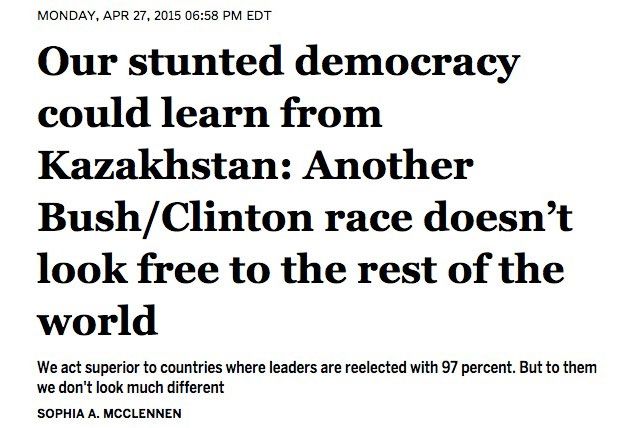
This week, Kazakhstan’s incumbent president Nursultan A. Nazarbayev won a fifth consecutive term with a whopping 97.7 percent of the vote. Such a high margin naturally lends itself to cynicism about the fairness of the proceedings from pro-democracy organs like Freedom House, which rates Kazakhstan as a “consolidated authoritarian regime” with a democracy score (on a scale of 1 to 7, with 7 being the worst) of 6.57. Nazarbayev is offended that his landslide victory could be seen as evidence of anything but his countrymen’s overwhelming approval. “I apologize if these numbers are unacceptable for the superdemocratic countries, but there was nothing I could do,” the president declared, “If I had interfered, it would have been undemocratic.” (Maybe next time he should tamp down his own margin by intentionally committing a campaign gaffe or letting some dissidents out of prison or something.)
Nazarbayev is not the only one miffed at the smug response from the “superdemocratic countries.” Writing for Salon, Sophia McClennen, professor of international affairs and comparative literature at Penn State, has a lecture for Americans who consider their electoral system oh-so-superior to Kazakhstan’s.
McClennen concedes that Kazakh’s electoral process has “democratic flaws.” Still, she argues, while the U.S. may have some advantages over Kazakhstan, the reverse holds true as well. “What if there are elements — not every element, mind you, but some — to Kazakh elections that are far superior to U.S. practices,” she writes, “and that we might be able to take a lesson from?”
For instance, she notes, Kazakh elections only take 30 days, which “means that their country is not embroiled in campaign drama more than a quarter of the time.” Indeed there’s no campaign drama at all, if you define drama to mean such things as permitting political rallies or media that criticizes the regime or any doubt about the outcome of the election. Those things can be quite distracting.
McClennen provides several other ways Kazakhstan’s elections exceed our own. Over there, “they don’t just limit the time frame for campaigns, they also limit money spent on campaigns and they guarantee all candidates state funds, making it possible for candidates without major backers to run a race.” Now, it may be true that the same man ends up winning the election every single time, but, asks McClennen, is it really so different here? “As I write from Almaty, Kazakhstan, the largest city in the country and the former capital, I find that locals think that our system also seems to revolve around the same cast of characters as well.” We consider their elections a massive repressive fraud, but Kazakhs — who surely feel free to share their unvarnished opinions with Westerners — feel the same about our elections. Who’s to say which side is right?

What’s more, McClennen argues, Kazakh’s media landscape has a lot to teach us:
The third Kazakh improvement is with media coverage. Much has been made of Kazakh media censorship, but when I researched this article and asked someone in the U.S. to send a screen capture of the same search, we got identical top results on Google. One Economist article unfavorable to President Nazarbaev appeared blocked, but I eventually was able to gain access to it from within the country.
In the U.S., the press may be free, but it is certainly controlled as well. There is significant research that shows the bias of Fox News and its influence on voting. It’s worse than that, though.
So Kazakhstan’s “improvement” over American political media is that it does not have Fox News. She does not mention certain features of the Kazakh media landscape that appear — at the risk of committing smug Western self-satisfaction — worse than having Fox News, per Human Rights Watch:
Independent journalists who criticize government policies and practices continue to face threats and harassment. Unidentified individuals have attacked journalists who write about controversial subjects.[i]In 2013 alone, media watchdog Adil Soz reported that there were 10 attacks on journalists. The new Criminal Code not only continues to criminalize libel but also increases penalties for the offense.[ii]
In December 2012, in rushed and perfunctory trials, courts banned the newspapers Vzglyad, Golos Respubliki, and their affiliated websites, and prohibited K+ and Stan.TV from broadcasting on grounds that they published information found “to incite social discord” and that called for the overthrow of the constitutional order.[iii] In January 2013, the Zhezkazgan youth newspaper was ordered to close and other newspapers including Pravda Kazakhstana, were suspended for three months on technical grounds. As recently as February 2014, the newspaper Pravdivaya Gazeta was similarly closed down after technical violations.After the Supreme Court upheld the ruling to close down Pravdivaya Gazeta in August 2014, OSCE Representative on Freedom of the Media Dunja Mijatovićexpressed concern about “disproportional sanctions for minor administrative violations.”[iv]
Again, McClennen isn’t saying the Kazakh system is perfect, only that the American system is terrible and Kazakhstan’s is better in a lot of ways. She not only points out that Kazakhs get to vote on weekends, which would truly be a major improvement in the United States, but also concludes that it has led to high levels of Kazakh voter participation:
This brings me to my fourth example of how Kazakh democracy is an improvement over ours. They hold elections on the weekend so that those who work have a better chance to vote. As we know from Sen. Bernie Sanders’ efforts to make the U,S, Election Day a holiday, our system of holding elections on a working weekday is deeply flawed. Put simply, our current practice disproportionately affects lower-income families, students and working mothers; it reduces turnout; and it comes close to voter suppression. U.S. voter turnout was only 54.9 percent in 2012 in a tight election. Kazakhs voting in what many called a “snap” election for president reached 95 percent.
You see, Americans? Kazakhstan has a 95 percent voter turnout rate. It puts us to shame, and also shows that you don’t need even the slightest bit of uncertainty about the outcome to have widespread excitement about the process. As she says, the Western media should stop being so “culturally arrogant” about Kazakhstan’s elections.






























